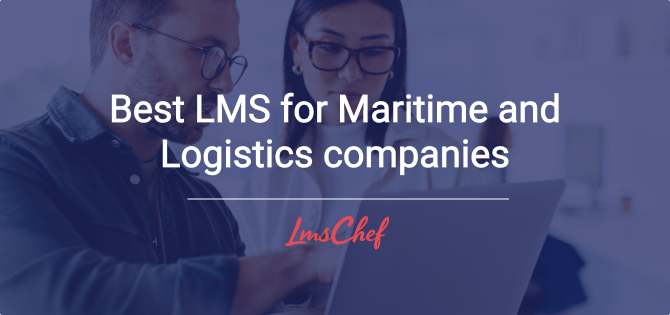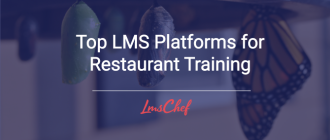The maritime and logistics industry has been around for centuries, but it is constantly evolving with the advancements in technology. One of the most significant changes in recent years has been the adoption of learning management systems (LMS) for logistics and shipping companies. These software solutions are transforming the way employees are trained and educated, leading to increased efficiency and improved safety in the industry.
In this article, I will explore the benefits of using LMS, the top features to look for in an LMS, and some real-world examples of companies that have successfully implemented these systems.
The Importance of LMS
The maritime and logistics industry is a complex and highly regulated field, with a constant need for training and education. From ship captains to warehouse workers, employees must have the necessary skills and knowledge to perform their jobs safely and efficiently.
Traditionally, training in this industry has been done through in-person sessions or through printed materials. However, these methods can be time-consuming, costly, and not always effective. With the introduction of LMS for maritime, companies can now provide online training and education to their employees, making the process more efficient and accessible.
Improved Safety and Compliance
Safety is a top priority in the maritime and logistics industry, and learning management system can play a crucial role in ensuring that employees are trained and up-to-date on safety protocols. With an LMS, companies can create and deliver safety training courses that are specific to their industry and comply with regulations.
LMS also allows for easy tracking and reporting of employee training, ensuring that all employees have completed the necessary safety courses. This not only helps to prevent accidents and injuries but also ensures compliance with industry regulations.
Increased Efficiency and Cost Savings
In a fast-paced industry like shipping, time is of the essence. With traditional training methods, employees may have to take time off work to attend in-person sessions, leading to lost productivity and increased costs for the company.
With an LMS, employees can access training materials at any time, from anywhere, making it more convenient and efficient. This also eliminates the need for printed materials, saving companies money on printing and distribution costs.
Customized Training for Different Roles
Not all employees in the marine and shipping industry have the same job responsibilities, and therefore, their training needs may differ. With an LMS, companies can create customized training courses for different roles, ensuring that employees receive the specific knowledge and skills they need to perform their jobs effectively.
Top Features to Look for in an LMS for Maritime and Logistics
When choosing an LMS for your transportation company, there are several key features to consider. These features will ensure that the LMS meets the specific needs of your industry and provides the best training experience for your employees.
- Mobile Compatibility
In an industry where employees are constantly on the move, it is essential to have an LMS that is compatible with mobile devices. This allows employees to access training materials on their smartphones or tablets, making it more convenient and accessible.
- Multi-language Support
The logistics industry is global, and many companies have employees from different countries and backgrounds. An LMS with multi-language support can provide training materials in different languages, ensuring that all employees can understand and benefit from the training.
- Interactive and Engaging Content
Traditional training methods can be dull and unengaging, leading to low retention rates. An LMS with interactive and engaging content, such as videos, quizzes, and simulations, can make the training experience more enjoyable and effective.
- Tracking and Reporting
Tracking and reporting are crucial features of an LMS for maritime. Companies need to know which employees have completed training and how they performed on assessments. This information can help identify any knowledge gaps and ensure that all employees are up-to-date on training.
- Integration with Other Systems
Many companies in the maritime and logistics industry use other software systems, such as customer relationship management (CRM) or enterprise resource planning (ERP) systems. An LMS that can integrate with these systems can provide a seamless training experience and make it easier to track employee progress.
Choosing the Best LMS for Maritime and Logistics
When selecting an LMS for your maritime and logistics company, it is essential to consider your specific needs and the features that will best meet those needs. Look for an LMS that is mobile-compatible, offers multi-language support, has interactive and engaging content, and can integrate with other systems.
It is also crucial to choose an LMS provider that has experience working with companies in the maritime and logistics industry. They will have a better understanding of your training needs and can provide a more tailored solution.
1. iSpring Learn
iSpring Learn is a learning management system (LMS) that offers a comprehensive solution for maritime companies looking to enhance their training processes. This LMS provides a range of features tailored to meet the specific needs of the maritime industry, ensuring efficient and effective training for employees.
Mobile Compatibility
iSpring Learn LMS is compatible with mobile devices, allowing employees in the maritime industry to access training materials on the go, making learning more convenient and accessible.
- Multi-language Support
Given the global nature of the maritime industry, iSpring Learn LMS offers multi-language support, enabling companies with diverse workforces to provide training materials in different languages.
- Interactive and Engaging Content
To enhance the training experience, iSpring Learn LMS provides interactive and engaging content such as videos, quizzes, and simulations, ensuring higher retention rates among employees.
- Tracking and Reporting
iSpring Learn LMS includes robust tracking and reporting features, allowing companies to monitor employee progress, identify knowledge gaps, and ensure compliance with training requirements.
- Integration with Other Systems
For seamless training management, iSpring Learn LMS can integrate with other software systems commonly used in the maritime industry, such as CRM or ERP systems, streamlining the training process and enhancing efficiency.
In conclusion, iSpring Learn LMS offers maritime companies a comprehensive solution to improve safety, compliance, efficiency, and employee training. By leveraging the key features of iSpring Learn, maritime companies can elevate their training programs and stay competitive in the evolving industry landscape.
2. Skilllake
Skilllake.com is a learning management system designed specifically for the maritime industry, offering a comprehensive solution to enhance training processes for shipping companies. This LMS provides a range of features tailored to meet the specific needs of the marine sector, ensuring efficient and effective training for your crew.
- Compatibility with Mobile Devices
LMS by Skilllake.com can be accessed on mobile devices, enabling maritime industry employees to avail training resources anytime, anywhere, thereby making learning more accessible and easier.
- Support for Multiple Languages
Recognizing the international scope of the logistics industry, the LMS from Skilllake.com offers support for multiple languages, allowing firms with varied workforces to furnish training content in several languages.
- Content that Engages and Interacts
To enrich the learning experience, the LMS from Skilllake.com delivers content that is interactive and captivating, including videos, quizzes, and simulations, leading to improved retention rates among employees.
- Tracking and Reporting
The LMS provided by Skilllake.com incorporates strong monitoring and reporting capabilities, enabling businesses to track employee advancement, pinpoint areas of insufficient knowledge, and guarantee adherence to training protocols.
- Integration with Other Systems
For hassle-free training operations, Skilllake.com LMS offers integration with other frequently utilized software in the maritime sector, like CRM or ERP systems. This enhances the training procedure by maximizing its efficiency.
To sum up, Skilllake.com LMS provides maritime firms a well-rounded solution to boost safety, compliance, productivity, and staff training. By utilizing the prime features of Skilllake.com, maritime firms
3. Marinels.com
Marinels.com provides a learning management system (LMS) purpose-built for the maritime industry, offering a complete solution to improve training procedures for transportation businesses. This LMS is customised to cater to the unique requirements of the maritime niche, guaranteeing productive and effective education for staff.
- Compatibility with Mobile Devices
The LMS by Marinels.com is available on mobile devices, enabling workers in the maritime field to reach educational materials whenever and wherever they want, thus facilitating easier and more convenient learning.
- Support for Multiple Languages
Understanding the international character of the shipping field, Marinels.com LMS ensures support for a variety of languages, allowing companies with varied teams to offer instructional content in different languages.
- Engaging and Interactive Content
Marinels.com’s LMS elevates the learning journey by offering captivating and interactive materials such as video tutorials, examinations, and imitations, which leads to better retention levels among staff members.
- Tracking and Reporting
The Learning Management System (LMS) of Marinels.com incorporates strong tracking and reporting capabilities. This enables businesses to track the progress of their employees, pinpoint areas where knowledge is lacking, and confirm adherence to training requisites.
- Integration with Other Systems
For streamlined training operations, Marinels.com LMS can integrate with other commonly used software systems in the maritime industry, such as CRM or ERP systems, enhancing the efficiency of the training process.
In conclusion, Marinels.com LMS provides maritime companies with a comprehensive solution to enhance safety, compliance, productivity, and employee training. By leveraging the key features of Marinels.com, maritime companies can elevate their training programs and remain competitive in the evolving industry landscape.
Real-World Examples
Several companies in the maritime and logistics industry have successfully implemented LMS to improve their training processes and achieve better results. Here are two examples of companies that have seen the benefits of using LMS.
Maersk Training
Maersk Training, a global provider of safety and technical training for the maritime, oil and gas, and wind industries, implemented an LMS to improve the efficiency and effectiveness of their training programs. With the LMS, they were able to create customized training courses for different roles and provide a more engaging learning experience for their employees.
The LMS also allowed for easy tracking and reporting of employee progress, ensuring that all employees were up-to-date on safety training. As a result, Maersk Training saw a 50% reduction in training time and a 30% increase in employee engagement.
DHL
DHL, a global logistics company, implemented an LMS to provide consistent training to their employees across different locations and time zones. With the LMS, they were able to create and deliver training courses in multiple languages, making it more accessible for their diverse workforce.
The LMS also allowed for easy tracking and reporting of employee progress, ensuring that all employees were up-to-date on training. As a result, DHL saw a 50% reduction in training costs and a 25% increase in employee satisfaction.
Conclusion
The maritime and logistics industry is constantly evolving, and the adoption of LMS is just one example of how technology is revolutionizing the industry. With the right LMS, companies can improve safety and compliance, increase efficiency and cost savings, and provide customized training for different roles.
When choosing an LMS for your maritime and logistics company, consider the features that will best meet your needs and choose a provider with experience in the industry. With the right LMS, you can take your training and education to the next level and stay ahead of the competition.







